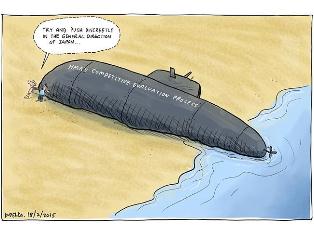 Jon Kudelka, The Australian, 18 February 2015
Jon Kudelka, The Australian, 18 February 2015 Former Australian Senator Graham Richardson went one step beyond with his op-ed on Friday last week, declaring that he had information from a “very reliable source” that a secret agreement existed between Japan and Australia whereby Australia would purchase submarines from Japan in exchange for Japan signing the FTA (or EPA depending on which side of the Pacific you stand) with Australia in July last year. This appeared to be nothing more than mischief making on behalf of Richardson, but it sent analysts into a flurry of activity speculating on whether such an agreement did exist, and what it would mean for the Abbott government should it be brought to light.
A more important point was made, I think, by Brendan Nicholson in an op-ed for the Australian newspaper on Thursday last week. Nicholson pointed out that while much of the dialogue about submarines and Japan’s involvement has centred around job losses in Adelaide, even if Australia only assumes responsibility for the maintenance of the new submarines, this work will require the same if not a larger submarine workforce. In other words, rather than resulting in fewer jobs, it will bring far more jobs to Adelaide, and be a sustainable industry in South Australia for the next 30 to 40 years.
Yet this message appears to have gotten lost somewhere in the commentary on the submarine choice (video). Chief of the Australian Defence Force, Air Chief Marshal Mark Binskin, himself said on Tuesday this week that the issue on submarines is not whether they should be built in Australia or not, but whether they can be sustained here.
The politicisation of the issue has, however, ensured that any arguments for the economic benefits of a sustainment program will be countered by claims of secret deals and of Australia surrendering its sovereignty to the US (who is reported to be behind the push for Japan to sell submarines to Australia). The ALP has declared that it is standing up for Australian industry in demanding both a competitive tender process and an Australian build and sustainment program, but economic arguments make a far more compelling case for an overseas build/Australian sustainment program.
It is by no means clear, it should be noted, that the Abbott government even intends to have the submarines built overseas. While former Australian Defence Minister David Johnston stated that the Abbott government would seek the best deal for Australia, and that a local build was therefore not guaranteed because of a need to mitigate risk, nowhere was there a categorical refusal to countenance Australian involvement in the submarine construction process.
If work on the replacement submarines is centred around South Australian shipyards, as both Johnston and Tony Abbott said it would be, then who is to say that this isn’t precisely what the Australian government intends? While it is true that the project might not involve the ASC (Australian Submarine Corporation), a semi-government institution charged with maintaining the current Collins class submarine (and which has been blamed for many of the problems that beset the Australian naval shipbuilding industry), the ASC is but one company making use of Techport Australia. Furthermore, if any overseas company wins the new submarine build contract, the ASC facility could be sold off or transferred to this foreign company. It has happened before – note BAE Systems ownership of the Williamstown shipyards outside Melbourne – and could very well happen again.
Yet the question of whether the politics of any submarine deal can survive the partisanship now on display can only be answered by an unequivocal statement from the government, and there's little chance of that coming before the release of the defence white paper at some point later this year. So prepare thyself for many more months of speculation, rumour, and denial.

 RSS Feed
RSS Feed